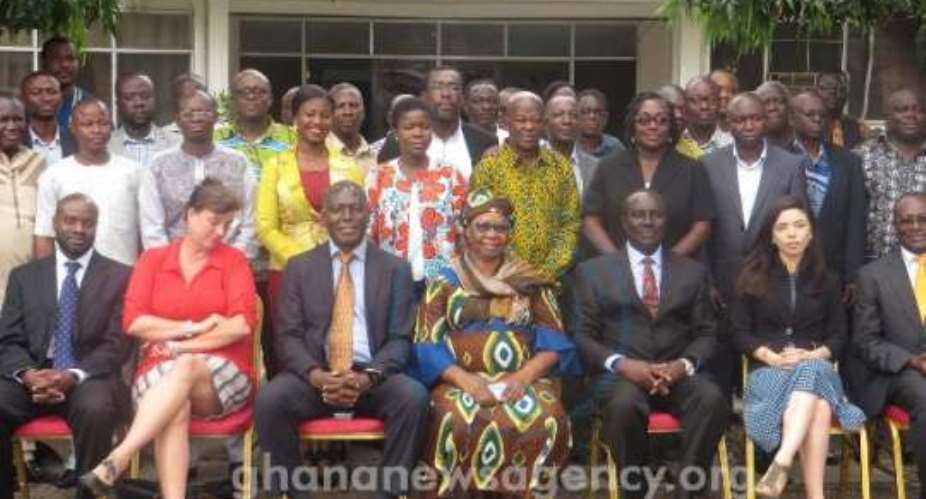Accra, Aug 31, GNA - Professor Kwabena Frimpong Boateng, Minister of Environment, Science, Technology, and Innovation, has called for the effective dissemination of research findings to all stakeholders to ensure greater productivity of the nation.
He said effective dissemination of research findings to stakeholders provided for a basis for innovation and also created the conditions for greater competitiveness and enhance the capacity for sustainable economic growth.
In this regard, the Minister urged all knowledge institutions - the research institutes and the universities - to take the issue of dissemination of research findings very seriously.
'We will also urge that, in doing so, the indigenous knowledge from our traditional farmers should be taken into account in all your research work,' Prof Frimpong Boateng stated in a speech read on his behalf on Thursday at a stakeholders' dissemination workshop in Accra.
The workshop dubbed 'Enhancing the use of Agricultural Science and Technology Indicators (ASTI) Data for Analysis and Policy Influencing Stakeholders' Workshop' was organised by the Council for Scientific and Industrial Research - Science and Technology Policy Research Institute (CSIR-STEPRI) in collaboration with the International Food Policy Research Institute (IFPRI).
ASTI is led by IFPRI through collaboration with national, regional and international partners to collect time series data on the funding, human resource capacity and outputs in agricultural research in low and middle-income countries.
Based on this information, ASTI produces datasets, analysis, capacity-building tools and outreach products to facilitate policies for effective and efficient agricultural research.
ASTI is widely recognized as the authoritative source of information on the status and direction of agricultural research systems in developing countries.
Some of the key objectives of ASTI are to provide high quality up-to-date data and information on agricultural Research and Development (R&D) to enable policy makers make informed decisions at national and regional levels in addition to building national and regional capacity for both data collection and analysis.
The main objective of the stakeholders' workshop was to present the achievements and outcomes of the ASTI surveys in Ghana over the past few years to all the relevant stakeholders in the agriculture sector.
More importantly it would increase awareness of the need to use ASTI data for analysis and influencing decision making by policymakers.
Prof Frimpong Boateng said the important role the agriculture sector plays in the country's economy cannot be overemphasized; declaring that 'the agricultural sector employs the largest work force in the country and the performance of the sector has a direct effect on the other sectors of the economy'.
He said despite its high performance over the years, the sector had seen a decline in its contribution to the country's gross domestic product (GDP) of 30 per cent in 2010 to about 22 per cent in 2016.
He said this observed declining trend though unacceptable, could be attributed to a number of factors such as the impact of climate change, limited human resource capacity, inadequate investment into the sector, inadequate application of Science Technology and Innovation (STI) in Agricultural production and quite recently pest infestation.
He said it was in the light of this that the government had taken the initiative to reverse this downward trend to a much greater development of the sector.
'One of these key initiatives is the introduction of the planting for food and jobs policy which seeks to ensure food security for the nation, create jobs to address youth unemployment and also serve as input to the industrialization drive policy by the government,' he said.
Dr Victor Agyemen, the Director General of CSIR, in a speech read on his behalf, said the decline in the fortunes of the agricultural sector in the country was a wakeup call to all stakeholders to take the necessary steps to ensure that the sector played its backbone roles for rural livelihood and poverty alleviation.
Dr George Owusu Essegbey, the Director STEPRI-CSIR, called for the re-engineering of the agricultural systems to let it make its rightful contributions to economic growth and social transformation.
Dr Kwaw Andam of the IFPRI Country Office in Ghana said timely high quality data plays an important role in agriculture research and development.
He urged participants to commit themselves to the dissemination of the findings of the ASTI and to ensure that the data were used to support policy making for Ghana's socioeconomic development.
GNA
By Iddi Yire/Cassandra Amegashie, GNA





 We’ll no longer tolerate your empty, unwarranted attacks – TUC blasts Prof Adei
We’ll no longer tolerate your empty, unwarranted attacks – TUC blasts Prof Adei
 Bawumia donates GHc200,000 to support Madina fire victims
Bawumia donates GHc200,000 to support Madina fire victims
 IMF to disburse US$360million third tranche to Ghana without creditors MoU
IMF to disburse US$360million third tranche to Ghana without creditors MoU
 Truck owner share insights into train collision incident
Truck owner share insights into train collision incident
 Paramount chief of Bassare Traditional Area passes on
Paramount chief of Bassare Traditional Area passes on
 Two teachers in court over alleged illegal possession of BECE papers
Two teachers in court over alleged illegal possession of BECE papers
 Sunyani: Victim allegedly shot by traditional warriors appeals for justice
Sunyani: Victim allegedly shot by traditional warriors appeals for justice
 Mahama vows to scrap teacher licensure exams, review Free SHS policy
Mahama vows to scrap teacher licensure exams, review Free SHS policy
 Government will replace burnt Madina shops with a new three-story, 120-store fac...
Government will replace burnt Madina shops with a new three-story, 120-store fac...
